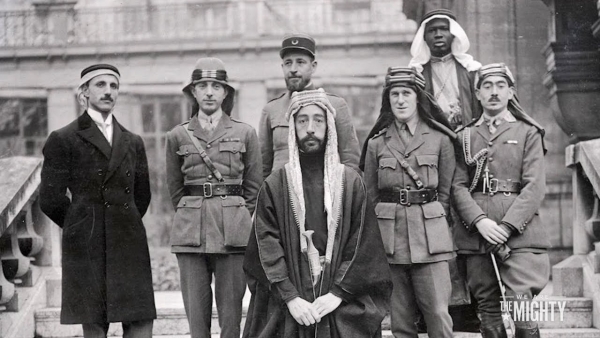This Week in History 1st October, 1918 - Lawrence of Arabia captures Damascus

On this day, October 1st 1918, a force of Arabian cavalrymen Led by Emir Feisal, son of Sherif Hussein, now to be King of Syria, and his British companion Lawrence, entered and captured the city of Damascus. This signaled the completion of the liberation of the Arabian Peninsula and cemented the reputation of T.E. Lawrence as a legendary British soldier and a hero amongst the people of the Arabic world.
Lawrence, an Oxford-educated Arabist born in Tremadoc, Wales, began working for the British army as an intelligence officer in Egypt in 1914. He spent more than a year in Cairo, processing intelligence information. Then in 1916, he accompanied a British diplomat to Arabia, where Hussein bin Ali, the emir of Mecca, had proclaimed a revolt against Turkish rule. Lawrence convinced his superiors to aid Hussein’s rebellion, and he was sent to join the Arabian army of Hussein’s son Feisal as a liaison officer.
The capture of the most famous city in the Arabic world was an event filled with high emotion for Major Lawrence and for Feisal, the Arab prince who had led tribesmen on their long fighting, camel march from the barren wastes of Arabia. The men were greeted by multitudes of Syrians who thronged the streets to celebrate their liberation from the Ottoman Empire.
Although Arabia was now free, Lawrence’s hope that the peninsula would be united as a single nation was dashed when Arabian factionalism came to the fore after Damascus. Lawrence, exhausted and disillusioned, left for England. Feeling that Britain had exacerbated the rivalries between the Arabian groups, he appeared before King George V and politely refused the medals offered to him. He is however fondly remembered as both a romantic and heroic figure by the people of many nations.
"I gave him a free hand. His co-operation was marked by the utmost loyalty, and I never had anything but praise for his work, which, indeed, was invaluable throughout the campaign. He was the mainspring of the Arab movement and knew their language, their manners and their mentality."
General Sir Edmund Allenby, commander-in-chief of the Allied Egyptian Expeditionary Force on TE Lawrence
Why not further explore the history and themes of this conflict on our upcoming tour:
Lawrence of Arabia Jordan and the Arab Revolt - 30th October - 7th November 2022. Led by our distinguished academic, Prof Nicholas Saunders
Added: 30th September 2022












